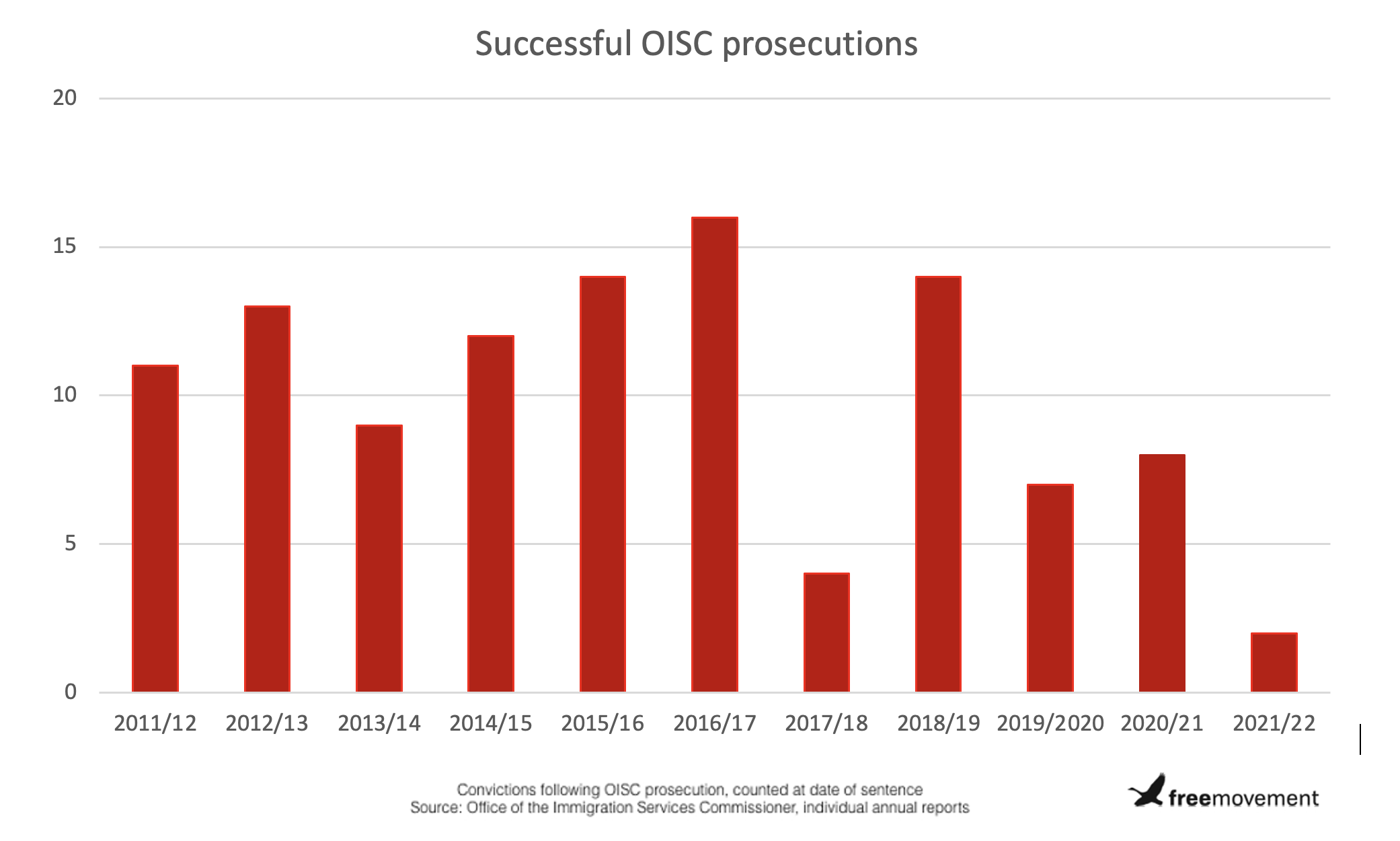- BY Josie Laidman

Regional enforcement, thematic audits, and a drop in convictions for immigration regulator
THANKS FOR READING
Older content is locked

A great deal of time and effort goes into producing the information on Free Movement, become a member of Free Movement to get unlimited access to all articles, and much, much more
TAKE FREE MOVEMENT FURTHER
By becoming a member of Free Movement, you not only support the hard-work that goes into maintaining the website, but get access to premium features;
- Single login for personal use
- FREE downloads of Free Movement ebooks
- Access to all Free Movement blog content
- Access to all our online training materials
- Access to our busy forums
- Downloadable CPD certificates
As we move into a post-pandemic working environment, the Office of the Immigration Services Commissioner (OISC) has been developing its working practices, according to the regulator’s annual report for 2021/22. And as it catches up on delayed investigations (conducting 81 in the year 2021/22) the OISC secures two convictions for illegal immigration advice in the last year. That is a drop from eight convictions the year before.

Of the two convictions, one individual received a custodial sentence and the other a community sentence. Both of them were ordered to repay fees or compensation.
The OISC’s annual report states that access to courts was the most significant impact of the pandemic and it continues to have an ongoing impact. A further three criminal prosecutions are awaiting trial as of 31 March 2022, when the OISC’s reporting year ended. Work on both complaints and criminal investigations had previously stalled, with staff unable to attend offices, or send relevant documents. Periods of illnesses within OISC and with immigration advisors have also contributed to delays. And no search warrants were executed between March 2020 (the beginning of the pandemic) and March 2022 for health and safety reasons, but these are also due to resume.
Complaints against unregulated immigration advisers have also dropped in the last year. 41 complaints were received, compared to 64 the previous year. Of these, 37 were taken forward for formal investigation this year, compared to 48 the previous year. Most (35) were Section 91 offences for providing unlawful immigration advice. The other six were for advertising unlawful immigration advice.
Over half (65%) of complaints resolved in the last year were done so in favour of the complainant. Whilst the OISC does not have statutory powers to force an organisation to refund fees to a client, in the last year 12 refunds were given, totalling £8,290.
Around 1,800 businesses and charities are regulated by the OISC, up by over 200 from 2020/21. In the last year, the OISC received 240 applications from previously unregulated organisations, compared to 151 applications in 2020/21. Much of the increase has been a result of the OISC’s response to the Ukraine crisis, by maximising the number of registered advisers who can give advice to Ukrainian nationals and providing warnings of the need to seek advice from registered advisers only.
Post-pandemic, the OISC has adopted a permanent remote-working business model. It has also begun its transition to three Regional Operations Teams that are proactively carrying out all regulation enforcement and engagement at a regional level and provide a regular presence in local areas. After positive feedback from immigration advisers about online competence assessments, these will also continue to be held remotely.
Whilst most audits continue to be conducted remotely, the OISC intends to resume some face-to-face audits where it believes this might be most effective for regulation. Two thematic audits were also conducted throughout the year, the results of which are detailed in the OISC spring newsletter.
Two randomly selected organisations were the subject of a thematic audit assessing compliance with Continued Professional Development (CPD) by assessing 150 advisers’ CPD training plans and records. Most organisations demonstrated the importance of having a CPD scheme and assessed their adviser’s needs annually. However, it is concerning that 52% of organisations confirmed that they had no training budget.
A second thematic audit looked at client care letters from 100 organisations. Most (83%) organisations issued client care letters and complied with the various aspects of Coode 26 of the Commissioners Code of Standards. But the audit showed that organisations need to ensure client care letters contain information about holding money on behalf of a client and about details around any additional costs clients may become liable for. A number of organisations also failed to provide an accurate initial attendance note. It was therefore not possible to assess whether the advice given in the initial meeting was reflected in the client care letter accurately.
The general increase in the number of regulated organisations and decrease in convictions is promising for the sector, even if we account for the three prosecutions still awaiting trial, delayed due to the impact of the pandemic. The thematic audits conducted this year are a good indicator of what organisations should be aware of as they develop their own working practices and similar future audits might be a welcome way of unifying immigration advice across organisations.
Immigration Advice Authority Level 1 training
Need help with the Immigration Advice Authority Level 1 exams? Join one of our live intensive small group courses.
Immigration Advice Authority Level 2 training
Taking things to the next level? Our Immigration Advice Authority Level 2 small group course is just what you need.
